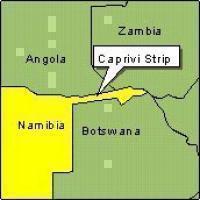







|
News and Information
Treason trial ruling dents the State's case
| December 9, 2005 |

* WERNER MENGES
THE last day of court proceedings in the main Caprivi high treason trial for the year 2005 delivered a major blow to the case for the prosecution yesterday.
A key part of the proceedings has been tainted by an irregularity; this in turn has compromised the fairness of the trial, Judge Elton Hoff concluded in a ruling on claims from the defence that the prosecution has been guilty of a range of irregular conduct so far.
On Thursday last week, defence counsel Patrick Kauta asked the Judge to make a special entry on the trial record to record that the trial proceedings had been irregular.
Judge Hoff dismissed most of the points on which Kauta based the defence application - but on another, which goes to the heart of the way that the prosecution is trying to prove its case against the 120 accused people in the trial, he ruled in the defence's favour.
The impact is that question marks have been raised over the integrity of one of the cornerstones of the prosecution's evidence: State witnesses' identification of accused people in the dock.
Judge Hoff dismissed Kauta's application to have a special entry made on the record on the basis of claims that the prosecution consulted with witnesses during adjournments, or that the prosecution suggested answers to witnesses in court, or that prosecutors consulted with witnesses while they were under cross-examination from the defence.
He also ruled that there was no evidence to support the defence's claims that State witnesses have been coached by the prosecution during adjournments in the trial, in the sense that they were told what to say in court in spite of what appeared in witness statements that they had made to the Police.
However, on a related aspect on the issue of coaching, the Judge ruled in the defence's favour, and had a special entry made in the record.
That entry states that proceedings in the trial have been irregular because the prosecution's use of photo albums during their consultations with State witnesses, who were later asked to identify suspects in court, had compromised the fairness of the trial.
Both the State and the defence accepted that no identification parades, at which prospective witnesses could point out people that they were to mention in their testimony, had been conducted before any of the witnesses testified.
When prosecutors consulted with witnesses before the start of their testimony, though, one of the members of the prosecution team, Taswald July, told the court, two albums with photos of the accused were shown to the witnesses to allow them to refresh their memories about the people they were to testify about.
"What weight now should this court attach to a dock identification in those circumstances where a witness had mentioned the name of an accused person in his witness statement and is not only shown a number of photos of accused person but is shown during consultation photographs together with the names and numbers of accused persons?" Judge Hoff asked in his ruling.
"The aforementioned practice by the prosecutors has the same effect (as) putting a leading question to a witness, which is generally prohibited.
One of the reasons underlying such prohibition against leading questions to a witness is that it suggests the desired answer.
In providing the photo album to a witness, it suggests the identification of an accused person still to be identified in the dock," Judge Hoff stated.
He added: "The accused persons find themselves in a compromising position in the dock and this court at the end of this trial will be required inter alia to assess the capacity of witnesses to identify accused persons which had been pointed out by them.
This unsatisfactory situation is further compounded by the fact that prior to the dock identification the witnesses are already provided with photos and names of accused persons.
This in my view is an irregularity which militates against any perception of fair play, and is prejudicial to the accused persons in the sense that it negatively affects their right to a fair trial."
Judge Hoff also criticised another practice of the prosecution, but stopped short of labelling that as an irregularity.
During the hearing of the defence's application for a special entry to be made in the trial record, the court heard that prosecutors continued to interview and consult State witnesses after the witnesses had started giving testimony but before their cross-examination had begun.
To do that, "is generally undesirable and should be discouraged", even though there is no rule of law that prohibits it, Judge Hoff stated.
"(T)he undesirability of such conduct in my view lies in the temptation of revising and rectifying the testimony of such a witness given prior to an adjournment," he said.
The trial was adjourned after Judge Hoff gave his ruling.
It is scheduled to resume on January 17 2006. |
Source: www.namibian.com.na |
| http://www.namibian.com.na/ |
|
| Support Caprivi Freedom |
Fill out the form below to become a member of this site and receive our regular newsletter.
|

|

